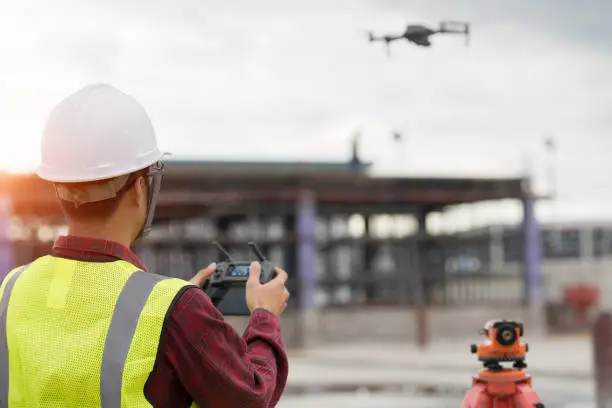Building Control Surveyor
In building surveying, the landscape is multifaceted, incorporating apprenticeship programs for aspiring building engineers. It covers critical aspects needed to ensure the safety, integrity, and compliance involving regulatory measures and the role of the approved inspector. As expert building control surveyors, we dive deep into the intricate domains that constitute building surveying, providing comprehensive insights into its diverse areas.
Why Building Surveyors Are Crucial for Safe and Compliant Construction
Building a house, extending a property, or renovating a commercial space – all these projects require ensuring safety, structural integrity, and adherence to regulations. This is where building surveyors emerge as vital players in the construction industry.
Beyond Brick and Mortar: The Role of a Building Surveyor
Building surveyors are much more than just construction analysts. They are specialists who act as guardians of public safety in the built environment. Their primary role is to ensure building regulations are followed, safeguarding the well-being of occupants. This can involve working with various entities like:
Local Authority Building Control (LABC): Collaborating with local authorities to ensure projects comply with regulations.
Chartered Institute of Building (CIOB): Adhering to professional standards set by England and Wales’s leading body for building and construction professionals.
Building Inspection
Inspecting buildings is the cornerstone of building surveying. It involves careful examinations to judge the condition and performance of structures, a key responsibility of building consultants. Building control surveyors do rigorous assessments. They use them to find defects, assess risks, and recommend fixes, often in the role of an examiner.
These fixes are to keep or improve building function and safety. This aspect includes both homes and businesses. They range from pre-purchase surveys to post-construction evaluations.
Compliance and Regulation
Navigating the complex web of building regulations and standards is key. It’s key in building surveying. Surveyors, many of whom are members of the Chartered Association of Building Engineers. Play a key role. They ensure structures meet local, national, and international codes and regulations.
These rules cover fire safety, accessibility, energy efficiency, and environmental sustainability. By keeping up with changing regulations, building control officers play a crucial role in maintaining the integrity of construction projects that are in line with CABE standards. Party wall surveyors help integrate compliance into building design and construction, ensuring all projects meet regulatory standards.
Structural Integrity
The strength of buildings is a key concern in surveying. It requires rigorous surveying to find out the stability and durability of parts. Surveyors use advanced techniques to evaluate buildings. They look at strength, resilience, and performance.
They find potential weaknesses, a task often delegated to specialized building inspectors. Then, they recommend changes or additions, sometimes after a thorough inspection. This aspect includes foundations and load-bearing parts, which are essential in evaluating the safety and durability of property developments. They also cover entire systems, focusing on building work and its compliance. The goal is to reduce risks and ensure longevity.
Defect Diagnosis and Resolution
Finding and fixing defects is also a key part of building surveying, which includes areas to ensure the integrity of new builds. It addresses issues that harm structures’ safety, function, or look. Surveyors use sharp analytical skills and diagnostic tools. They use them to find defects.
These defects range from structural cracks and moisture ingress to building envelope issues and material decay. By offering comprehensive defect diagnosis services, building control surveyors facilitate timely interventions and remedial measures to preserve the integrity and value of buildings, highlighting the essential contributions of consultants.
Project Management and Consultation
Building surveyors are trusted advisors and project managers, many holding qualifications from esteemed institutions like the Royal Institution of Chartered Surveyors. They offer invaluable guidance and expertise throughout construction projects. From initial feasibility and design consultations to project oversight and quality assurance, building control surveyors are pivotal in optimizing project outcomes and mitigating risks.
Surveyors use their technical skills and industry knowledge, often striving to gain RICS qualifications. They ensure construction projects go smoothly while sticking to timelines, budgets, and quality standards, a benchmark of bodies like CABE.
Building Conservation and Heritage
Preserving buildings’ architectural heritage and cultural significance is a top concern in building surveying. It includes conservation efforts to protect historic structures and landmarks, a principle that aligns with the sustainability goals of RICS. Surveyors specialize in heritage conservation.
They use sensitive approaches to maintain the authenticity and integrity of heritage assets. Building control surveyors also adapt them for modern needs and functions. Through meticulous preservation strategies and adaptive reuse initiatives, surveyors contribute to the cultural enrichment and sustainability of built environments, a mission embraced by those in construction consultancy and consultancy.
Environmental Sustainability and Performance
Building surveyors play a crucial role in an era of growing environmental awareness. They promote sustainability and energy efficiency in the built environment, adhering to the principles of RICS and CABE. Surveyors assess buildings for energy performance, carbon footprint, and environmental impact, contributing to the goals of sustainability endorsed by professional bodies.
Building control surveyors recommend sustainable design strategies and retrofitting solutions to cut resource use and fight climate change. Surveyors integrate green building principles and renewable technologies. They foster environmentally responsible practices that align with global sustainability goals.
Conclusion
Building surveying covers many areas, including the crucial involvement of engineers. These range from inspection and compliance to assessing structures and diagnosing defects. It also includes project management, heritage conservation, environmental sustainability, and the construction or renovation of the building, all standards promoted by professional bodies such as RICS and CABE.
Building control surveyors ensure the safety, function, and sustainability of structures, following the guidelines of CABE and achieving qualifications like those offered by RICS. They do this while upholding rules and preserving architectural heritage, adhering to the standards of the Royal Institution of Chartered Surveyors.
FAQs
1. What is a building control surveyor?
Building control surveyors are qualified professionals who ensure building projects comply with regulations. They review plans, conduct site examinations, and issue approvals for safe and compliant construction.
2. What does a building control officer (BCO) do?
Building control officers are the entry point for building control. They assist building control surveyors with examining, paperwork, and initial communication with developers.
3. What qualifications do I need to become a building control surveyor?
Building control surveyors typically require an HNC/HND in building studies, surveying, or a related field. In-depth knowledge of building regulations and ongoing professional development are essential.
4. How can I become a building control surveyor?
The path involves relevant qualifications, experience through roles like a building control officer, and registration as a building control surveyor or approved inspector. (Research relevant professional bodies or government websites for details).
5. What is the difference between a building control surveyor and an approved inspector?
Building control surveyors often work for local authorities, while approved inspectors are qualified professionals who can provide building control services independently to clients.
6. What are the responsibilities of a building control inspector during a development?
Building control inspectors review plans, conduct site inspections at various stages, and issue approvals or certificates upon satisfactory completion.

